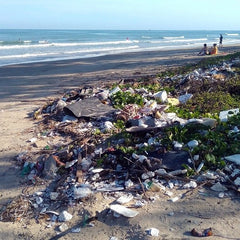
The global fight against the Covid-19 virus has created a dramatic plastic waste time bomb for the oceans and the maritime ecosystems, which we only start to measure. Time is running out. The increasing plastic pollution in the sea urges us to take action on our own consumption patterns, and especially limit our consumption of single-use plastic. In the article below, we share the infographic “Covid19 - a plastic waste time bomb”, which shows the effects of the pandemic on Ocean plastic pollution.
Ocean plastic was already a huge problem before Covid...
Did you know that, on our planet, there is a continent entirely made of plastic? If you haven’t heard of the Great Pacific Garbage Patch yet, it’s time to get acquainted. Located halfway between Hawaii and California, it is the world's biggest ocean plastic waste repository, with 1.8 billion pieces of floating plastic, accumulated together by ocean currents. Nicknamed “the 8th continent”, the Great Pacific garbage patch is part of the 5 offshore plastic accumulation zones in the world’s oceans. With an estimated surface area of 1.6 million square kilometres, this largest of the five whirlpools alone has an area 3 times the size of France!

But since Coronavirus, plastic pollution is exploding!
In the battle against the Coronavirus, the need for affordable, disposable plastic has risen. The pandemic created a dramatic increase in single-used plastic products, like plastic-made face masks and examination gloves. And with Corona lockdowns, we tend to order more food deliveries or take-away, which produces a lot of plastic food containers, to-go coffee cups, etc. As a result, a lot more of this dangerous plastic waste will end up in our oceans…



Infographic - Covid-19, a plastic-waste time bomb

Together in 2021, let’s save our planet from plastic!
This year, we need to curb our consumption of plastic. And to give the oceans a fighting chance, we need to consciously assess the quantity of plastic that we buy everyday, from very basic plastic water bottles and plastic bags, to more complex stuff, like single-use paper masks, toothbrush, shampoo bottles, lighters and food containers, which are made of plastic and can take up to 400 years to decompose… Below we have compiled a small list of things you can do: if everyone makes a little effort, it can have a big impact.



Stop plastic: what can we do to save the Ocean?
“By 2050, there will be more plastic than fish in the sea.” You want to help save marine life from plastic pollution? Here is what you can do: follow the 3 R principle: ”Reduce, Reuse, Recycle”, as mentioned in SAILMATE’s infographic above, and their top 10 list. To help you further, we’ve added 8 more things you can do to help fight the plastic pollution problem. Here are our suggestions:
- Replace your shampoo and shower gel plastic bottles by plastic-free body & hair soaps. Use the lockdown to switch to hair soap if you haven't already, no one sees the Bad Hair Days now! Read our tutorial “how do i wash my hair with soap?” for a smooth transition.
- Learn how to reliably clean your FFP2 mask instead of throwing it away every time.
- Shopping online? Order from sustainable webshops that ship without plastic.
- Take part in a Covid-safe cleanup walk: meet a friend outside and collect litter together on your way (at the beach, near a canal or river, on the street). In Covid times you have some free time anyway, and it always feels good to do something useful for the environment.
- Inform yourself: read about the Great Pacific Garbage Patch on the Ocean Cleanup Foundation website and share your knowledge with others.
- Start visualising the amount of plastic you have at home: in your bathroom, everytime you finish a toothpaste, face wash or body cream, put it in a basket. After a few months, you’ll be shocked at the amount of plastic that surrounds you.
- As the blogger Treehugger puts it: When you’re about to buy something that contains plastic, ask yourself: "Do I need this enough to justify this plastic being around FOREVER?” Most times, with a quick internet research, you’ll be able to find a plastic-free alternative.
- Follow Zero Waste influencers on Instagram like @wasteless_hero or @uselessplastic. They give lots of ideas on how to simply use less plastic in your everyday life.



For more information
We would like to thank SAILMATE for this very useful infographic they shared with us. We are happy to see that so many Hamburg-based companies are joining the fight against plastic waste. If you'd also like to share this infographic, don’t forget to mention SAILMATE. If you want to learn more about the ocean plastic pollution problem, you can watch the documentary “A Plastic Ocean” by the Plastic Oceans Foundation; it is available on Netflix and other streaming services.









Leave a comment
This site is protected by hCaptcha and the hCaptcha Privacy Policy and Terms of Service apply.